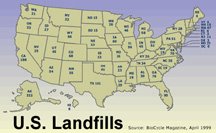Bills would extend moratorium on landfills
Canton Repository
Friday, November 11, 2005
BY PAUL E. KOSTYU COPLEY COLUMBUS BUREAU CHIEF
COLUMBUS - Legislation by two Stark County lawmakers to stop landfills in Northeast Ohio, at least temporarily, has been introduced in both chambers of the Ohio Legislature.
State Rep. Scott Oelslager, R-North Canton, and state Sen. Kirk Schuring, R-Jackson Township, introduced companion bills Thursday.
Both bills would establish a moratorium on permits and licenses for new landfills and the expansion of current facilities in a 13-county area of the Tuscarawas River Basin. The moratorium would apply to both solid waste and construction, demolition debris facilities and remain in place for five years or until a study is completed by the U.S. Geological Survey, whichever is shorter.
The legislation also would allow solid waste management districts to pay for the study.
A six-month moratorium on the siting of new construction, demolition debris facilities and the expansion of existing facilities expires Dec. 31.
Meanwhile, a committee vote on another House bill that would revise the law governing construction and demolition dumps was delayed Wednesday until next week.
The bill, introduced by state Rep. John Hagan, R-Marlboro Township, is based on the final report of a study council created by the state’s biennial budget to look at regulation of the landfills. Hagan was on the council, which was chaired by state Rep. Thomas Collier, R-Mount Vernon. Collier also chairs the House Economic Development and Environment Committee, which is hearing Hagan’s bill.
Northeast Ohio has the greatest concentration of landfills in the country. Some of them sit over a massive aquifer the stretches across 13 counties, including Stark, Tuscarawas, Wayne and Holmes.
Schuring and Oelslager have been working on their bills since September. Schuring said then the area needs the study because the aquifer has a significant effect on commercial, municipal and residential water supplies.
The two lawmakers included the provision to allow solid waste management districts to pay for the U.S. Geological Survey study after the Ohio Environmental Protection Agency raised concerns that money received from tipping fees cannot by state law be used on water studies. The agency also questioned whether one district had the authority to pay for a survey that included areas outside its boundary and would consider sources of pollution other than landfills, including agricultural, commercial and industrial sites.
Reach Copley Columbus Bureau Chief Paul E. Kostyu at (614) 222-8901 or e-mail: paul.kostyu@cantonrep.com
Friday, November 11, 2005
BY PAUL E. KOSTYU COPLEY COLUMBUS BUREAU CHIEF
COLUMBUS - Legislation by two Stark County lawmakers to stop landfills in Northeast Ohio, at least temporarily, has been introduced in both chambers of the Ohio Legislature.
State Rep. Scott Oelslager, R-North Canton, and state Sen. Kirk Schuring, R-Jackson Township, introduced companion bills Thursday.
Both bills would establish a moratorium on permits and licenses for new landfills and the expansion of current facilities in a 13-county area of the Tuscarawas River Basin. The moratorium would apply to both solid waste and construction, demolition debris facilities and remain in place for five years or until a study is completed by the U.S. Geological Survey, whichever is shorter.
The legislation also would allow solid waste management districts to pay for the study.
A six-month moratorium on the siting of new construction, demolition debris facilities and the expansion of existing facilities expires Dec. 31.
Meanwhile, a committee vote on another House bill that would revise the law governing construction and demolition dumps was delayed Wednesday until next week.
The bill, introduced by state Rep. John Hagan, R-Marlboro Township, is based on the final report of a study council created by the state’s biennial budget to look at regulation of the landfills. Hagan was on the council, which was chaired by state Rep. Thomas Collier, R-Mount Vernon. Collier also chairs the House Economic Development and Environment Committee, which is hearing Hagan’s bill.
Northeast Ohio has the greatest concentration of landfills in the country. Some of them sit over a massive aquifer the stretches across 13 counties, including Stark, Tuscarawas, Wayne and Holmes.
Schuring and Oelslager have been working on their bills since September. Schuring said then the area needs the study because the aquifer has a significant effect on commercial, municipal and residential water supplies.
The two lawmakers included the provision to allow solid waste management districts to pay for the U.S. Geological Survey study after the Ohio Environmental Protection Agency raised concerns that money received from tipping fees cannot by state law be used on water studies. The agency also questioned whether one district had the authority to pay for a survey that included areas outside its boundary and would consider sources of pollution other than landfills, including agricultural, commercial and industrial sites.
Reach Copley Columbus Bureau Chief Paul E. Kostyu at (614) 222-8901 or e-mail: paul.kostyu@cantonrep.com














<< Home